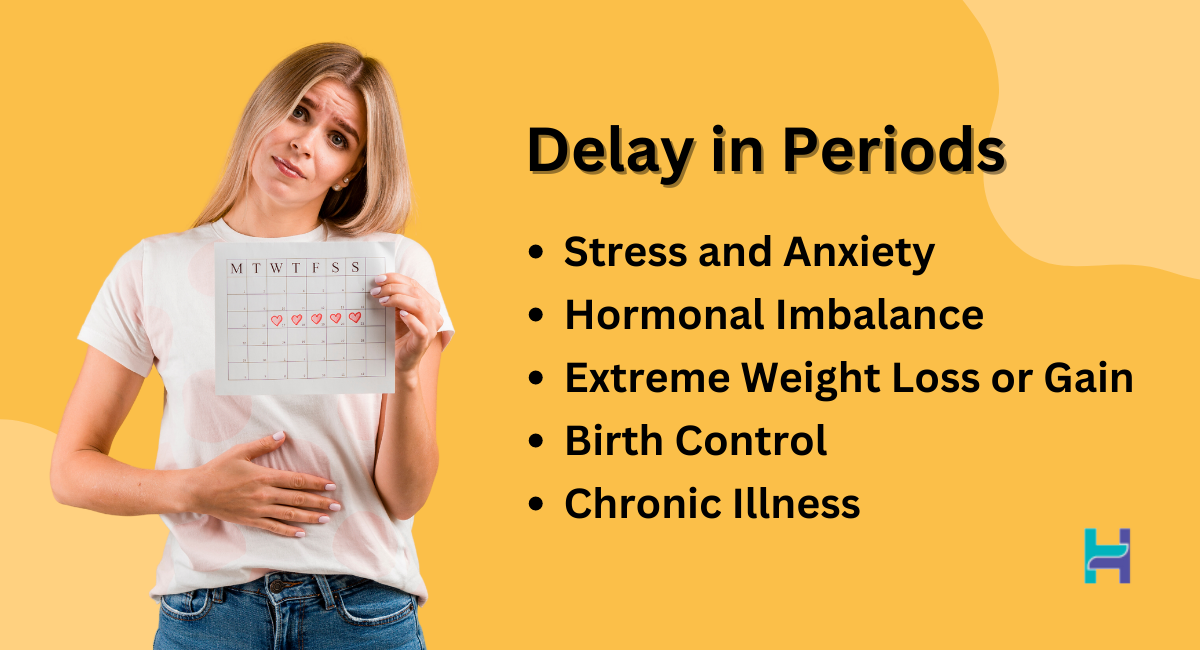We're going to talk about a topic that might seem a little bit uncomfortable, but it's really important for all girls to know about. We're going to talk about late periods and menstrual cycle irregularities. Your period is an important indicator of your overall health. If your periods are irregular, it might be a sign that something is not right within. Plus, knowing about the different causes of late periods can help you understand your body better and feel more in control of your health.
In this blog, we'll be discussing 10 possible causes of late periods. Some of these causes are totally normal and nothing to worry about, while others might require doctors attention. By the end of this blog, you'll have a better understanding of what might be causing your late period and what you can do about it.
Here are the 10 Possible Causes of Late Periods
1. Stress and Anxiety: Stress and anxiety can cause a hormonal imbalance in the body, which can disrupt the menstrual cycle. When you're stressed or anxious, your body produces more of the hormone cortisol, which can interfere with the production of other hormones that regulate your menstrual cycle. If you're experiencing a lot of stress, it's important to find ways to manage it, such as through exercise or relaxation techniques.
2. Hormonal Imbalance: Hormonal imbalances can be caused by a variety of factors, including stress, weight changes, or medical conditions like PCOS. These imbalances can cause irregular periods or a complete absence of periods. Treatment options depend on the cause of the hormonal imbalance and may include medication or lifestyle changes.
Also read: Vaginal infections and delayed periods
3. Polycystic Ovary Syndrome (PCOS): PCOS is a hormonal disorder that can cause irregular periods, as well as other symptoms like acne, weight gain, and excess hair growth. PCOS is caused by an imbalance of hormones in the body, and treatment options vary depending on the severity of the condition and the patient's individual needs.
4. Thyroid Problems: Thyroid problems can cause a range of menstrual cycle irregularities, including late periods. The thyroid gland produces hormones that regulate metabolism, and when the gland is not functioning properly it can disrupt the production of other hormones in the body. Treatment for thyroid problems may include medication or other medical interventions.
5. Extreme Weight Loss or Gain: Rapid weight loss or gain can cause hormonal imbalances in the body, which can lead to late or missed periods. This is because hormones like estrogen are stored in fat cells, so changes in body weight can affect the body's hormone levels. Maintaining a healthy weight through balanced nutrition and exercise can help prevent menstrual cycle irregularities.
Also read: Healthy Juices for Period Pain
6. Birth Control: Certain types of birth control, such as hormonal birth control pills, can cause changes in the menstrual cycle. Some women may experience lighter periods or no periods at all while using birth control. If you're concerned about your menstrual cycle while using birth control, talk to your doctor to discuss other options.
7. Certain Medications: Certain medications, such as antidepressants or chemotherapy drugs, can cause menstrual cycle irregularities. If you're taking medication and notice changes in your menstrual cycle, talk to your doctor or gynocologist to determine if the medication is the cause.
8. Perimenopause or Menopause: As women age, their menstrual cycles naturally become less regular and eventually stop altogether, signaling the onset of menopause. Perimenopause is the period of time leading up to menopause, during which menstrual cycles may become irregular. Hormone replacement therapy may be an option for women experiencing severe symptoms during menopause.
9. Chronic Illnesses: Chronic illnesses like diabetes or lupus can affect the menstrual cycle. These conditions can cause hormonal imbalances, which can lead to irregular periods. Treatment for chronic illnesses often involves medication or other medical interventions.
10. Pregnancy or Breastfeeding: Pregnancy and breastfeeding can both cause changes in the menstrual cycle. During pregnancy, the body's hormone levels shift to support the growing fetus, which can lead to changes in the menstrual cycle. While breastfeeding, hormones that regulate the menstrual cycle are suppressed, which can cause a temporary absence of periods. If you're concerned about your menstrual cycle during pregnancy or breastfeeding, talk to your family doctor.

What to do when periods are late
If you experience a delay in your menstrual cycle, it is generally not a cause for immediate concern. However, if you miss your period for more than three consecutive months, it is recommended that you visit a doctor. Delayed periods can be caused by a variety of factors, including stress, hormonal imbalances, and certain medical conditions.
It's important to note that delayed periods can sometimes be a sign of pregnancy. If you have missed your period and suspect that you may be pregnant, it is recommended that you take a home pregnancy test or visit a doctor for a confirmatory test.
Also read: Does menstruation impact thyroid tests
In conclusion
Late periods can be a common concern among women and can be caused by a variety of factors. We have discussed 10 possible causes of late periods, including stress, hormonal imbalances, PCOS, thyroid problems, extreme weight loss or gain, birth control, certain medications, perimenopause or menopause, chronic illnesses, and pregnancy or breastfeeding.
To our readers, we encourage you to continue sharing your experiences in our comment section below.


